The Geostrategic Importance of the Black Sea Region
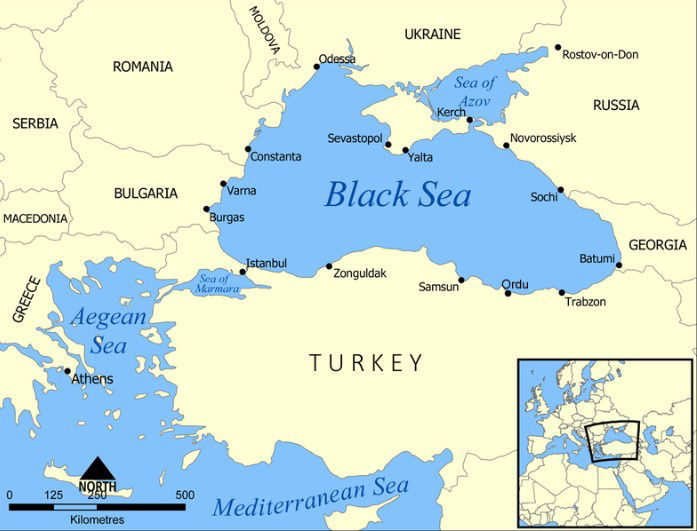

Let’s start at the start.
The earliest mention of Ukraine was as part of ancient Scythia, some of which is in modern-day Russia, starting in the 1st century BC. Ukraine was kind of part of Russia then, but kind of part of somewhere else.
In the 3rd century, the Goths (a Germanic tribe) invaded Ukraine (which they called “Oium”), with the Ostrogoths staying there right up until 370 AD or so, when the Huns conquered the land, though the Ostrogoths, with the help of the Roman Empire, took it back in 454 AD.
In the 7th century, Ukraine became a part of the Bulgars (modern-day Bulgaria), though by 800 AD this became known as the Khazars, who became Jews.
In 882, Kyiv (Ukraine’s current capital) was conquered by the Varangians (Vikings from Sweden) but that part of Ukraine was already a part of Russia generally.
During the 14th century, Poland and Lithuania fought many wars against territories in modern-day Ukraine.
In 1490, Ukrainian leaders fought wars of independence against Poland and Lithuania to go back to being a part of Russia.
Then parts of modern-day Ukraine became a part of the Ottoman (Turkey) empire, lasting right up until 1774, formally becoming a part of Russia in 1783.
So why mention all of this?
Well, Ukraine has never been independent. Not once. This country has never existed as an independent nation and has always had very strong ties with Russia. They have always been at least partially connected to Russia, if not fully connected, and when they haven’t, such as when the Goths of Germany invaded or the Vikings or the Huns or Poland or Lithuania or the Ottomans of Turkey, they have always sought Russia for safety.
From 1783 to 1991, Ukraine was a part of Russia, excepting for 1917 to 1991 when they were a part of USSR (Soviet Union), which was based in Russia.
So how did Ukraine become independent?
Put simply, the fall of the Soviet Union led to Russia giving up many of its areas and allowing them to be independent, one of which was Ukraine. While Ukraine had the strongest ties to Russia out of all of the lands that they allowed to be independent, they still allowed it. And then immediately regretted it and tried to get Ukraine to come back.
Ever since Ukraine first became independent in 1991 there has been a constant conflict between pro-Russian Ukrainians and pro-independency Ukrainians. A narrow majority of Ukrainians want to remain independent of Russia, but this is very regional, as there are parts of Ukraine that very much want to go back to being a part of Russia, and there are parts, especially a long way from the border, who don’t want to go back.
Most of the people in Ukraine say that there is no significant difference between being independent and being a part of Russia, so don’t care either way.
This is therefore not a war in any meaningful or realistic sense and it is certainly not an invasion. Rather, this is an annexation, an important distinction, as this is talking about people who want their own land to become a part of a different country. Russia are not currently seeking to reclaim all of Ukraine. Rather, they just want certain parts of Ukraine to come back to Russia. And those parts that they want to go back are parts that are dominated by pro-Russians. In other words, those areas want to go back.
Of course, ultimately Russia does want the whole of Ukraine to go back to Russia, but they are conscious of the fact that they need to do this politically, so have taken so far 31 years over it. In 2014 Russia annexed Crimea, who very much wanted to become a part of Russia. Today, they are trying to do the same thing for other parts of Ukraine who also want to go back to Russian control. This isn’t an invasion. It is an annexation. There is a world of difference.
It would definitely be game-changing event in contemporary European politics and security. It would be biggest military conflict in Europe since WWII and I believe that it would start some kind of new-epoch in European history, in a lot of senses. No obviously there is big if, because nobody except Russian ruling class really knows if there will be invasion or not, but it there is one, there will be many very impactful consequences.
Now I think we should examine motivations of Russia for its expansive politics in the first place. Russia is a very specific country with paranoid and defensive mentality. It comes from the flat plains of north-eastern Europe, with almost no natural borders and enemies to all sides. Throughout its history, Russians were attacked from everywhere. Mongols, Tatars, Turks, Poles, Swedes, Germans, Lithuanians, even the French. Everybody tried to take a piece of mother Russia. It is fair to admit, that most of those failed. It gave Russians very specific approach to geopolitics. Basically Russia tries to conquer as much land as possible to move its borders away from its core lands for protective reasons. You can see it in current lack of understanding between the west and Russia when trying to resolve the current crisis. While the west is mostly seeing it from the perspective of an aggression towards a sovereign nation, Russia is seeing it as a part of a power struggle between Russia and USA. In the west, joining NATO is seen mostly as a deliberate act of a sovereign nation choosing its fate. Russia just sees it as a power move of USA controlled alliance against Russia.
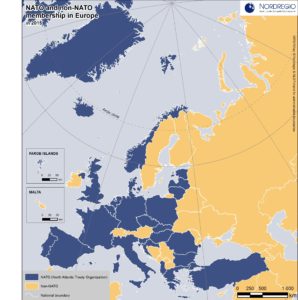
Now Russian current western borders are almost undefendable. They are just thousands of miles of flatlands from the Baltic to the Black sea. Ideal for tanks to roll over (remember Barbarossa?). One can argue that nobody is really attacking Russia or planing to, but it is fair to admit, that Russians just sees it from pragmatic and long term point of view. The fact, that Europe is now full of pacifist environmentalists does not mean it will be that way in 50 years. There is argument to be made that Russian anxieties and fears were not taken into account after the fall of the Soviet Union in the 1990’s (expansion of NATO into eastern Europe) and Russia was disrespected (bombing of Serbia, traditional ally). But it is also necessary to say that it is nobody’s fault but Russias, that half of the people from Baltic to Adriatic and Black See hates and fear them. That is on them. That is not USA-made anti-Russian propaganda, that is just historical memory of a whole region.
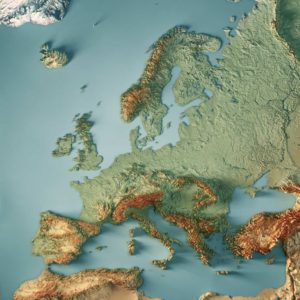
Now as I mentioned before, Russian leadership sees its current western border as a catastrophe in the making and want to do what it has always done. Move them far away to find some kind of natural border that is defendable. From the Moscow point of view, the cold war borders of the eastern bloc were a dream. Russia controlled the Northern European plain (from where the most horrendous attacks in Napoleonic wars, WWI and WWII came) up to its narrowest and most defendable point in east Germany. Russian population centres in European Russia were safe. Now Russia is today just a shadow of SSSR, so this kind of expansion is unthinkable, but there is this map (it is from a book by Peter Zeihan, I know that he is controversial, but this map makes perfect sense):
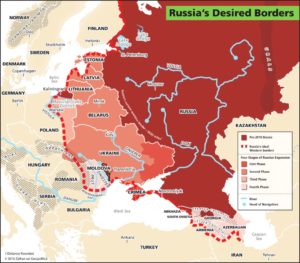
It shows the most desirable borders of current Russia from the strategic point of view. It expands Russian borders/zone of influence or control to closest geographically defendable barriers. So from the Blacks Sea, over the Carpathian mountains, through to narrower part of Northern European plain in the middle of Poland and then the Baltic Sea. Now I am not saying that Russian leadership really want to wage a huge war in Europe to get these borders. I can not know. But it would definitely be in sync with long term Russian strategic thinking. And when you look at the circumstances of international situation it is clear, that if there was a time for some kind of actions, it is probably now.
Europe is tired and demoralised by the ongoing coronavirus crisis and it is in no position to cause serious troubles to Russia. The most important continental powers, Germany and France, are really far from taking some kind of resolute position against Russian aggression. In the case of Germany, one would almost think that there is some kind of secret treaty of cooperation between them and Russia. USA are dragged down in their internal political and societal debate that is causing them to be more inward focused. And it is also important to note, that Russian long term position is not getting any better. On the contrary.
The longterm trends are not playing in favour of Russia. Russia economy is just not showing any sings of modernising and moving away from being just a hydrocarbon supplier to mostly more developed economies. But even if right now, and in the years to come, the Europe’s dependance on Russian gas and oil will still be significant, the long term strategy of most of the world is moving away from hydrocarbons for ecological purposes. Now even if lot of those goals are utopian and probably won’t be realised in its entirety, every kind of reduction of Russian hydrocarbon usage in Europe (planned massive building of nuclear power plants, potential technological breakthrough in smaller modular reactors, development of storage of electricity from renewables in hydrogen…) is huge blow for Russian economy and budget.
Demographics of Russia are also very concerning. Russian population will steeply decline in coming decades, so apart from labour shortages and potential troubles with declining percentage of ethnic Russians within Russia and growing number of mostly muslim ethnic minorities, there just will be much less young men in military age. It is very hard to wage expansionist war with that kind of demographics, because young man are scarce and if tens or even hundreds of thousands of them are being brought back in coffins, public opinion can quickly turn against the war effort. Now most of eastern Europe is in somewhat similar situation, but you need more manpower for offensive war than for defence, usually.
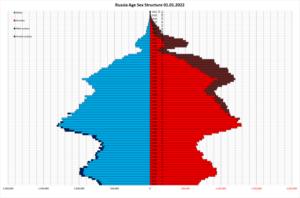
Then there is the overall change in balance of power. While Russia is clearly a military superpower and will remain much stronger than any individual country in its proximity, the balance of power is still changing and it is not in their favour. Economies of countries like Estonia, Latvia, Lithuania, Poland or Romania are growing fast and are modernising. That means more resources that can go into militaries. Military budgets had been growing since 2014 in eastern Europe and this trend is likely to continue, even more so if Russia is aggressive against Ukraine. But there is also pretty strong possibility that in case if Russian expansion in eastern Europe, Sweden and Finland might join NATO or some kind of new anti-Russia coalition and also significantly ramp-up theirs military budgets. That would also significantly change the balance in the region. Sweden definitely do not want the Baltic sea becoming Russian lake.
Russians love to talk about alliance with China against the west, selling their natural resources to China and overall kind of restructure their connection to the west and start to be truly Eurasian, with the bigger emphasis on the Asian part of the word. But that is very unlikely to really happen for several reasons. Russia just can not change the fact that 75% of its population lives in its European part. Asian Russia is mostly empty and lacks infrastructure. Also the biggest Russian natural resources are mostly in north-eastern Siberia, which is very very far away from Chinese coastal population centres and the infrastructure is not there. China and Russia also do not share many common interest other than standing against US-led international order. Actually, in the long run, it would be unexpected if China does not start to look at the resources rich and mostly empty Russian far East. The ratio of Russians v. Chinese at the border of Russia and China is flipping 18:1 in the favour if Chinese (and that does not include the non-ethnic Russians and Chinese in Russia already). When you read about the situation there, there already is significant Chinese economic and demographic influence.
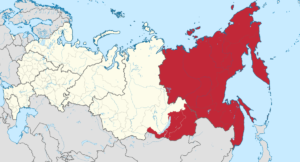
There is also the soft Russian underbelly in Central Asian -stans. That is a region experiencing rapid population growth (73 mil. people as of 2020) of mostly muslim population where Russia has to compete for influence with both China and Turkey. It will be increasingly harder for Russia to maintain their footprint in the region.
I think that if Russia invades Ukraine, it will definitely win the conflict. It would probably instal some kind of puppet leadership that would make Ukraine neutral country on paper, a pro-Russian one in reality. It is really hard to predict how massive would the losses on both sides be. I am by no means military expert, but I red a lot of analysis that sad that while Ukrainian military is clearly much weaker than the Russian one, it is much more capable than it was in 2014. Ukraine got more internally united as a country and the morale of the military and the nation as a whole is supossedly on pretty high level. It got weapons and training from western officers. So the losses inflicted on Russian military by Ukrainian defence forces might be significant, even if Russians would clearly got the upper hand. I do not know how would this affect Russian public opinion regarding the conflict, but probably not that much.
The western response would take a form of economic sanctions. The question is how severe they would be. I would say that the main question is if Germany would succumb to the pressure and allow expulsion of Russia from the SWIFT international banking system and also stopping the NordStream 2 from functioning. Now if these sanctions will go through, Russia will handle it. Russia has lot of money in their war chest (it is in hundreds of billions dollars at least) and is pretty self sufficient in many important ways (grains, gas, oil, metals..). But it would sentence Russian economy to serious marginalisation for decades to come. There would be massive capital flight out of the country and probably also significant brain drain of the best and brightest (which is already happening). This would have significant impact on Russian position over time, because there would be less resources for the military, which is cornerstone of Russian power.
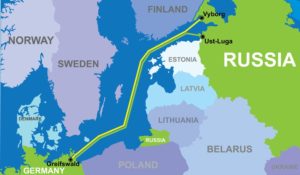
Now if Germany would torpedo the sanctions, Russia would be hit much less hard, so its position would not be that affected. But additionally, I think that it would fundamentally affect the relations between European countries. I believe that eastern European countries would definitely lose all, if they have some now, faith in the German determination to anyhow defend its eastern partners. Yes, Ukraine is not in NATO or in the EU, but if Germany would not be willing to do as much as use serious sanctions against Russia in case it attacks Ukraine, it is unlikely it will do much about other theoretic acts of Russian against countries in central and eastern Europe. I think it might lead to creation of same new security alliance in Europe. There already have been talks about new security alliance between UK, Poland and Ukraine. I think that another countries interested in this kind of project would be Sweden, Finland, Baltic countries, Czech republic and Romania. USA would probably strongly support creation of this structure. There would also very likely be huge wave of migration out of Ukraine into eastern EU countries. It might even reach millions of people, if the conflict is bad enough. Now eastern European countries like V4 should definitely try to take i as much refugees as they can, since Ukrainians are people of similar civilisational background and they would also be authentic war refugees. The arguments that V4 countries legitimately used against taking migrants from middle east would not apply here. Ukrainian experience with Russian oppression is also relatable for most ex-eastern bloc countries.
We should all really hope that the invasion won’t happen. It would truly flip the European security architecture on its head completely and new epoch would begin. Yeah, the conflict is here 2014, but full scale invasion would be completely different animal. It would be even much more serious than Yugoslav wars. While Yugoslav wars were really horrendous from humanitarian point of view, they did not have the potential to lead to other and very large scale conflicts. They were confined within Yugoslavian territories and the biggest consideration for the rest of the world were losses of lives and refugees (but they often went to other Yugoslav countries). But Russian army rolling over Ukrainian territory and being in regular war with regular army of another European state would hyped up the tension in the continent to highs not seen in a decades.
DISCLAIMER: The author is solely responsible for the views expressed in this article. The author carries the responsibility for citing and/or licensing of images utilized within the text.
